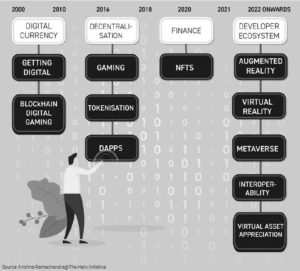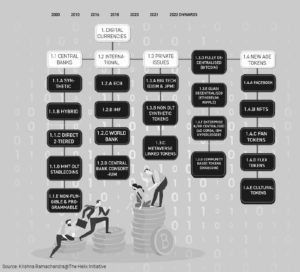Duane Morris & Selvam LLP | View firm profile
The metaverse has been on the minds of several practitioners, advisers, corporate strategists and central bankers. But, the Generation Z participants – or zoomers as they are affectionately known as – are not thinking it – they are well into being it, living it and expanding the ever evolving Metaverse. So, if you have not heard about the Metaverse, it’s time for you to elegantly crawl out of your intellectual rock and start to understand the nuances and idiosyncrasies around this metamorphosis surrounding the digital universe. All corporates and businesses need to start re-calibrating their business strategies to cater for the zoomers – who by the way form the largest consumer base presently. And the zoomers will continue to dictate their terms of engagement with all consumer ecosystems, including with the big techs. We are in the zoomer’s realm and the development of their Metaverse epoch is inevitable. In my mind, Ready Player One (and Two) in some form is already here.
Metamorphosis of Social Engagement
So what exactly is the Metaverse? Lets not over-complicate what it really is. But here is the thing – you have to view it in physiological terms. Your mind has to be freely accepting of the limitless possibilities of new forms of social engagement to actually then be able to enter the realm of the Metaverse. It is a dynamically evolving and an all-embracing, all-engulfing movement that converts anything in its digital path.
Raoul Pal, the legendary visionary macro-strategist of our times, has artfully described the Metaverse as our present existence with oscillating interactions with the digital world – it is the digital fluidity of our existence.
The Metaverse embraces the ultimate virtual 3D world, which spans across shared and private digital experiences. Just like how we travel from one place to another physically to do our activities, zoomers in particular now do the same within the digital realm as they navigate the Metaverse to interact, collaborate, and immerse themselves – almost in a world of their own. They do not care if you do not value a piece of art for $69 million because they will and they are happy to burn the physical art pieces to make their point. And that’s the point businesses need to get. Whilst the concept of a Metaverse is a buzzword, the Metaverse has always been existent in some form or degree. Such experiences may have even started with the television and radio where we consume content visually and audibly, through websites ranging from games to text to videos, video games for education and entertainment, and social media like video messaging to conferences to other media sharing applications.

Limitless Possibilities
The metaverse represents infinite possibilities only limited by the human imagination and technology. As the two expand, so do the opportunities and solutions to mankind. These can range from running simulations to fabricating value-creation-events. Just as we have physical spaces and physical goods, so too do we have digital spaces and digital goods that are now able to interact with each other through certain tools and applications. In this sense, it is said that these are the closest interactions in which we are able to utilize the ability to time travel and or the ability to traverse alternate realities.
Sports & Gaming
In the sphere of video games and video entertainment, we should expect that the Metaverse and blockchain protocols will converge to find solutions to the age-old problems like real world trading and democratization of finance. However, the industry has undergone many iterations without it, alongside entrenching entities which are quite resistant to such decentralized solutions being made available in the market. Travis Scott’s collaboration with Fortnite was astronomical in more ways than just the event title. It has opened up a world where sports and entertainment personalities must start developing their own value monetizations strategy, which these days can be captured in a slew of non-fungible tokens (“NFTs”). The given diagrams attempt to capture the manner in which the digital currencies and token economies have staked a claim in the culturalization of the zoomers and their attendant ecosystems (Please see Figure 1 and 2 for reference).

NFTs
The NFT moniker is sadly a nomenclature mishap – as were ICOs (initial coin offerings). NFTs are not merely digital representation of assets, like the digital art purchases earlier this year that drove NFTs to prominence. NFTs are quite simply very advanced smart contracting language that can capture a whole host of rights to any digital asset. The term can capture trailing royalty rights, as can it dynamically align itself with further options to enhance the base rights. It will certainly allow Cristiano Ronaldo to bring fan engagement to another universe – perhaps the Metaverse!
Distributed Ledger Infrastructure Protocols
In its current state, we iterate that blockchain is not the catch-all technology for video games but rather a good backend solutions provider to fill in some gaps within the industry: with the most obvious implementations covering payments, authentication, p2p decentralized trading, ownership, user generated content, and infrastructure support. I predict that when the extremely skilled and talented pool of game developing coders converge onto the blockchain infrastructure protocol ecosystem we will witness a swift and exponential upgrade to existing infrastructure protocols that still struggle with the layer two conundrum. The door has already been opened by projects like EQBR and their Equilibrium infrastructure protocol, Slush wallet and Whisper messaging that promises to integrate all worlds of the metaverse and the decentralised ecosystems. More projects like EQBR will no doubt follow their lead and it can only result in a more sophisticated and democratised ecosystem where De-fi, Game-Fi and Flex-Fi will flourish. Flex-Fi is what I deem the next big ecosystem to be. Where participants get to digitally flex their conspicuous consumerism for the world to see! That’s the zoomers for you.
Ready up for the next play.
* Krishna Ramachandra is a globally recognised international corporate finance lawyer with a deep technology slant within his practice and is widely acclaimed to be a thought leader and a leading practitioner in the field of sports and gaming, blockchain, capital markets, fintech and corporate governance.
About Duane Morris & Selvam LLP Duane Morris & Selvam LLP (DMS) is a joint law venture between international firm Duane Morris LLP (DM) and Singapore-based firm Selvam LLC. DMS runs a unique Latin American-Asian practice out of Singapore, with a team of international lawyers qualified in multiple jurisdictions including Singapore, the US, the UK, Canada, Mexico and Colombia, with substantial experience in international transactions and disputes. DMS also has a wide cooperation network with some of the best Latin American and Asian law firms.
Disclaimer: This Alert has been prepared and published for informational purposes only and is not offered, nor should be construed, as legal advice. For more information, please see the firm’s full disclaimer.